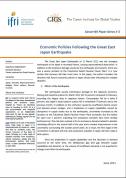Prospects for 6-party talks: Nuclear weapons are a means of survival for Kim Jung Un

The most imperative duty of the third-generation Kim Jong Un is the “survival” of North Korea. This will require not only a smooth transfer of power from his father but also shoring up the national economy. This is because I feel the current regime will sooner or later come to the end of its tether unless North Korean economy breaks free of foreign dependence and begins to grow autonomously.
In May 2011 I had the opportunity to visit the capital Pyongyang and its environs. The North Korean economy I saw there was truly miserable. In farming villages, although rice planting had already begun I hardly saw any equipment such as tractors or rice planting machines.
I realized then that there would be no tomorrow for North Korean agriculture still done entirely with manual labor. What’s more, the people’s economic grievances will likely grow as the heredity of power reaches a third generation. The mourning period aside, even Kim Jong Un, for his part, will eventually have to improve the national economic system and build a society capable of reproduction.
The bottom line is that it is not only a matter of Kim Jong Un surviving as the third generation of the “Kim Dynasty” but also the fact that he has been left with the extremely difficult task of giving the “Democratic People’s Republic of Korea” system a chance to survive in the mournful years to come.

Available in:
Regions and themes
Share
Download the full analysis
This page contains only a summary of our work. If you would like to have access to all the information from our research on the subject, you can download the full version in PDF format.
Prospects for 6-party talks: Nuclear weapons are a means of survival for Kim Jung Un
Related centers and programs
Discover our other research centers and programsFind out more
Discover all our analysesJapan’s Takaichi Landslide: A New Face of Power
Prime Minister Sanae Takaichi has turned her exceptional popularity into a historic political victory. The snap elections of February 8 delivered an overwhelming majority for the Liberal Democratic Party (LDP), driven by strong support from young voters, drawn to her iconoclastic and dynamic image, and from conservative voters reassured by her vision of national assertiveness. This popularity lays the foundation for an ambitious strategy on both the domestic and international fronts.
The U.S. Policy Toward Taiwan Beyond Donald Trump: Mapping the American Stakeholders of U.S.-Taiwan Relations
Donald Trump’s return to the White House reintroduced acute uncertainty into the security commitment of the United States (U.S.) to Taiwan. Unlike President Joe Biden, who repeatedly stated the determination to defend Taiwan, President Trump refrains from commenting on the hypothetical U.S. response in the context of a cross-Strait crisis.

China’s Strategy Toward Pacific Island countries: Countering Taiwan and Western Influence
Over the past decade, China has deployed a diplomatic strategy toward the Pacific Island Countries (PICs). This strategy pursues two main objectives: countering Taiwan's diplomatic influence in the region and countering the influence of liberal democracies in what Beijing refers to as the "Global South."

Opening up the G7 to South Korea to Address Contemporary Global Challenges
The G7’s global influence has diminished as powers like China reshape international governance through initiatives such as BRICS and the Shanghai Cooperation Organisation (SCO). With the G7 now representing just 10 per cent of the world’s population and 28 per cent of global GDP, its relevance is increasingly questioned.








